
Why Do Agencies Use and Need SEO Software?
Agencies use SEO software for the automation of their day to day tasks.
With over 3,000 agency customers, here at SEOptimer we're privileged to get unique insights into agency life, marketing workflows and the tools that are used, and are hoping to share that knowledge with you.
Some of the things we've observed, are that:
- Staffing makes up the biggest chunk of an agency's cost base, and so any tooling and automation that can make work quicker and easier is an immediate win - hence SaaS tools are heavily used.
- SEO projects have a big range of manual tasks, and need specialized data and insights. Simply put, without SEO software, digital agencies drown in manual work and can't efficiently scale and become profitable.
- It's common for agencies to use many SEO tools. Due to unique client requirements and functional needs, it's very rare for one SEO tool to deliver on all the functionality a digital agency needs. Here at SEOptimer, we know we play a role in a broader workflow that includes several other key tools.
What Software Features are Best for SEO Agencies?
This list of the best SEO software for agencies covers a wide array of tools and each has their specific features.
Digital agencies who perform SEO services for their clients usually have 6 main functional requirements:
Site Auditing
Everything starts with a site audit.
This process involves many checks related to the on-page SEO factors of a page encompassing metadata, content, links, page load speed, user experience, social and more (this is what SEOptimer platform specializes in).
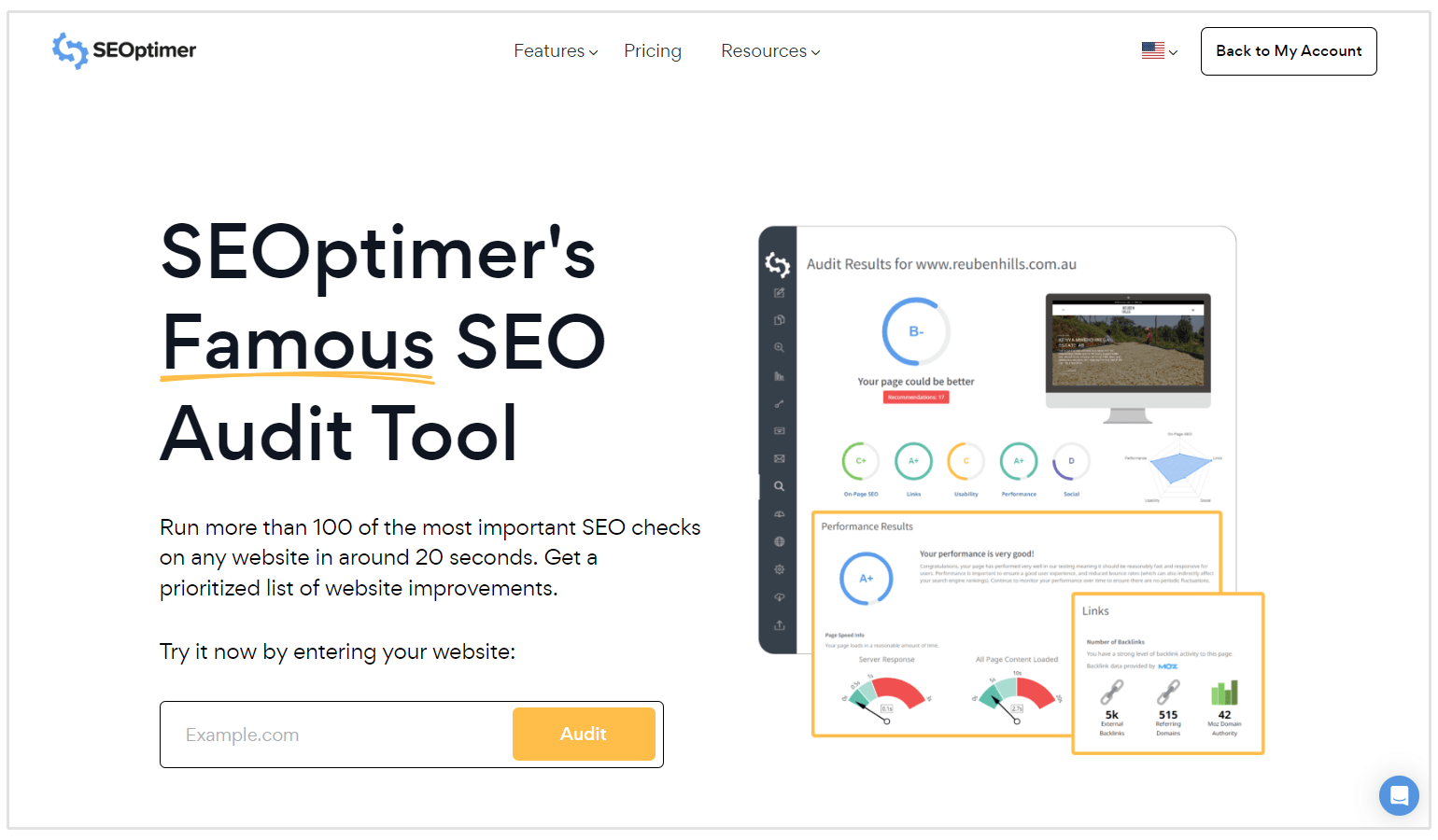
Website Crawling
This involves crawling an entire site (yes, every single page) - to find potential SEO issues that are holding back a site from ranking.
Keyword Rank Tracking
This process involves tracking the position of your pages in search results for your target keywords.
![]()
Backlink Tracking
This feature tracks and audits the number and quality of sites that link back to you.
Content Optimization
This involves auditing and refining the content - as in the actual words on the page - and the structure of your page to help outrank competitors.
Outreach
This assists you with workflows and discovery to identify target blogs and publications who you can reach out to in order to pitch your content / links to gain backlinks from authoritative websites.
With these six typical features in mind, we compiled this list in collaboration with 18 SEO experts from some of the top SEO and digital agencies around the world.
Our goal was to understand how these tools fit into their workflow and what features they utilize to deliver outstanding client results.
SEO Experts Feautured in this Post



These SEO experts come from a diverse array of digital agencies around the world with an equally diverse roster of clients and industries.
But one thing is common across everyone - they all rely on SEO software to deliver high-quality SEO projects to their clients.
- Bryan Philips, Head of Marketing at In Motion Marketing 🇦🇺
- Ashley Regan-Scherf, Executive Content Writer at RGC Advertising 🇦🇺
- Aqib Noor, Content Specialist at Puppetbrush 🇨🇦
- Jasween Narang, Senior SEO Executive at Elsner Technologies 🇮🇳
- Umarah Hussain, PR Specialist at Surge Marketing Solutions 🇬🇧
- Richard Kennedy, Owner at Arken Marketing 🇬🇧
- Martina Nakov, SEO Specialist at Best Response Media 🇬🇧
- James Oliver, Director at Evolved Toaster 🇬🇧
- Matt Thomason, SEO Consultant and Founder at Witney SEO Guy 🇬🇧
- Brandie Erisman, Owner at Riverview Lane 🇺🇸
- Veronica Fernandes, SEO Expert & Writer at Creative Media Technology 🇺🇸
- Cary Haun, Technical SEO Specialist at Twelve Three Media 🇺🇸
- Timothy Josiah Haynes, VP of Content & SEO at Clara 🇺🇸
- John McGhee, Managing Partner at Webconsuls 🇺🇸
- Jake Peterson, SEO Specialist at ATIBA 🇺🇸
- Nathan Sebastian, Content Marketer at GoodFirms 🇺🇸
- Solomon Thimothy, Co-Founder at Clickx 🇺🇸
- Jon Torres, SEO Marketer and Founder at JonTorres.com 🇺🇸
How to Choose the Best SEO Software for Agencies
As with most software, it's difficult to know whether a piece of software will suit your agency without rigorously testing it first.
Look for tools that offer free trials so you and your team can evaluate them properly before committing.
Some tools are low-cost while others in the enterprise SEO agency software space can be very expensive.
Thankfully, all the tools included on our list are either free or low cost making them ideal for most digital agencies.
These are some of the biggest deciding factors when choosing the right SEO software for your agency:
Breadth of Functionality
After assessing your functional needs make sure you define your 'SEO tool stack' so that you have adequate coverage.
There are likely to be overlaps, but that's fine. Most digital agencies prioritize their core features then look for best-in-class tools to deliver each one.
Accuracy
This can be hard to assess but the typical approach is to benchmark two or more tools against each other at the same task.
For functionality like site auditing, sometimes the 'accuracy' here might come down more to softer measures like how information is displayed and your preferences for the report format and customizability.
Cost
There's no denying cost is a big deciding factor for most agencies. Clients want value for money and so too should agency owners expect bang for buck from software vendors.
When weighing up software monthly fees, consider the cost per month vs the cost per hour for someone on your team with the right expertise to fulfill the task without software.
Often, software tools are a no-brainer when it comes to ROI.
Innovation
The SEO industry is moving at a considerable pace with new developments, algorithm tweaks and best practices changing all the time.
Try to get a read on how often each tool updates their tech and rolls out new features.
Check the tool's blog and social media profiles - when did they last announce a new feature? Was it last month or 2 years ago?
Ratings / reviews
Most reputable SEO software has been thoroughly reviewed and rated online.
Look to trusted review sites like G2 and read what others have said about each tool you're considering.
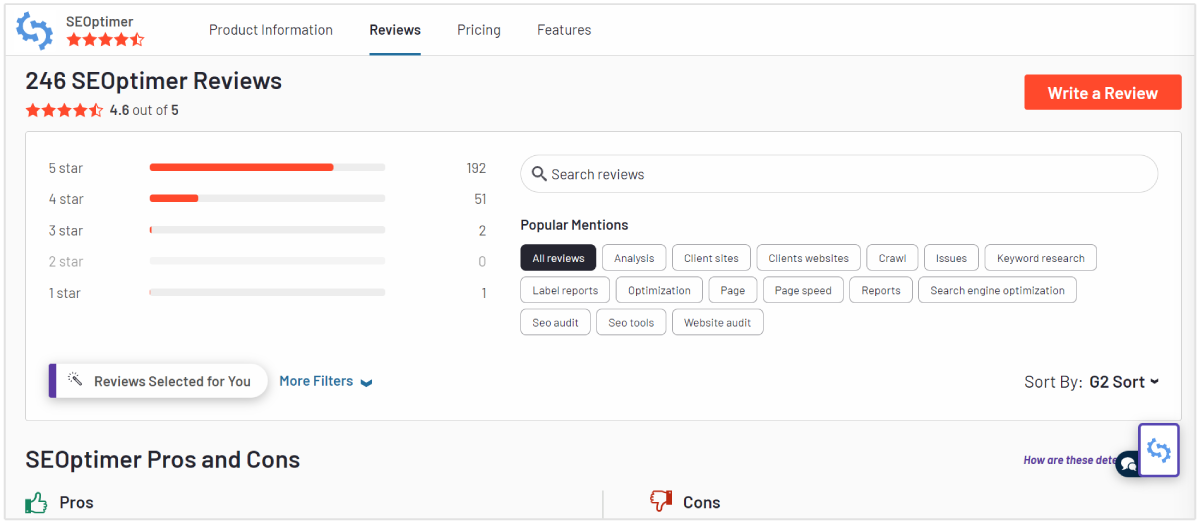
With all these factors in mind, nothing beats hearing from industry peers and finding out what their go-to SEO tools are, so let's dive in.
The 18 best SEO Software for Agencies According to SEO Experts
1. SEOptimer
Jasween Narang, Senior SEO Executive at Indian digital development agency Elsner Technologies uses SEOptimer.

Jasween relies on SEOptimer, one of the leading SEO audit and reporting tools for digital agencies.
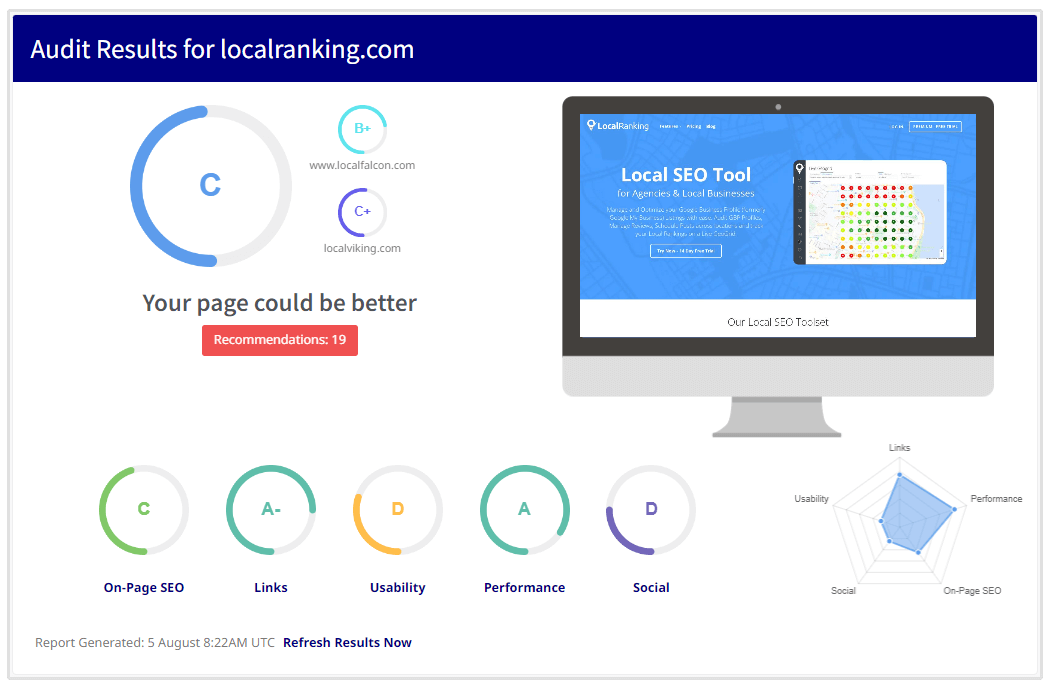
"For technical SEO site audits there are many tools available on the market. In 2018 we were using another other tool for this but it was lacking some features so we decided to switch to SEOptimer. I used the free version initially and found it to be one of the best tools I've used for SEO audits."
Jasween recommends SEOptimer because:
- It provides you a list of accurate on-page & off-page issues on any website
- Provides you a list of your keywords and ranking with the location along with changes in position (you don't need to buy another tool to check keyword ranking and performance)
- The audits cover other aspects of SEO such as usability, technical SEO, performance and even social media
- Last but not least, this tool is very affordable and easy to use
In addition to that, we’ve also added a bunch of great new features to expand SEOptimer’s suite of SEO tools for agencies.
These include:
- Backlink Research: see all the backlinks pointing to a site or page, as well as the site’s key domain metrics.
- Keyword Research: find low-hanging keyword opportunities and see monthly search volume, competition, SERP results, estimated traffic volume and estimated CPC.
- Backlink Monitoring: get notified of New and Lost Links, protect from negative SEO, and build a great link profile.
2. Ahrefs Webmaster Tools
Matt Thomson, UK-based SEO Consultant and Founder at Witney SEO Guy uses Ahrefs Webmaster Tools (AWT).

AWT is Ahrefs' free SEO monitoring tool for auditing sites, checking backlink data and highlighting top-performing keywords.
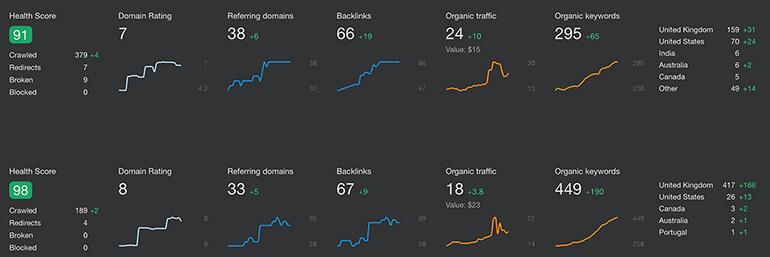
Matt likes AWT because it helps put things into perspective for his clients and allows them to see key metrics such as backlinks, organic traffic and Ahrefs Domain Rating at a glance.
"I tend to start most client relationships with an SEO audit and Ahrefs Webmaster Tools is really useful for this. The only thing it isn't so good for is competitor research tasks. But I've introduced Ahrefs Webmaster Tools to a number of clients and they love it. Especially the fact that it's free!"
Ahrefs position AWT as somewhat of a competitor to Google Search Console (GSC) and compare themselves to GSC across a number of primary features:
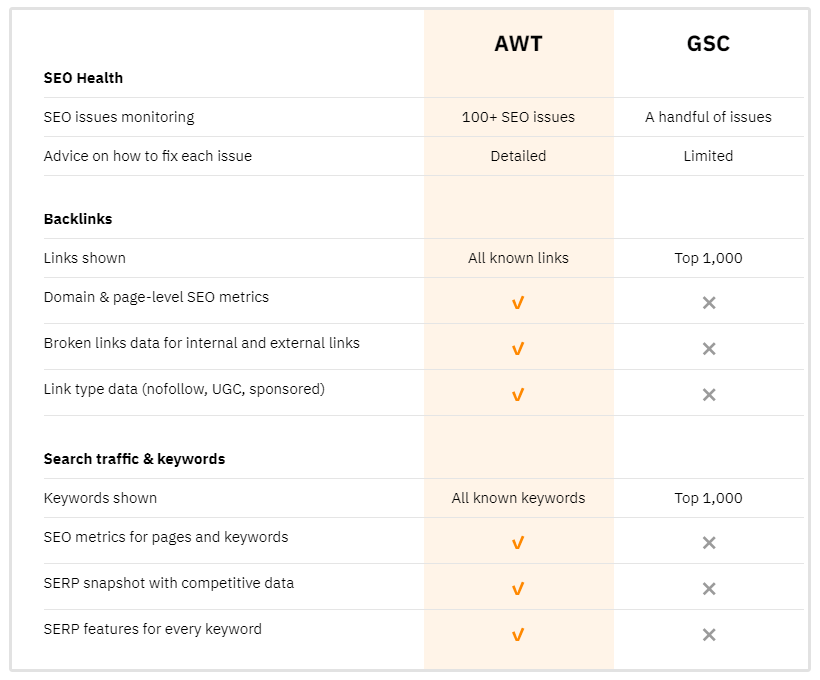
3. Google Search Console
Umarah Hussain, PR Specialist at UK digital agency Surge Marketing Solutions uses the full suite of Google tools including Google Search Console (GSC).

GSC is the essential search performance insight tool from Google. GSC's 4 key metrics that should be tracked for every client include:
- Total clicks from organic search
- Total search impressions (on the search results page)
- Average CTR (Click Through Rate) from search result page to website
- Average Position (rank on the search result page)
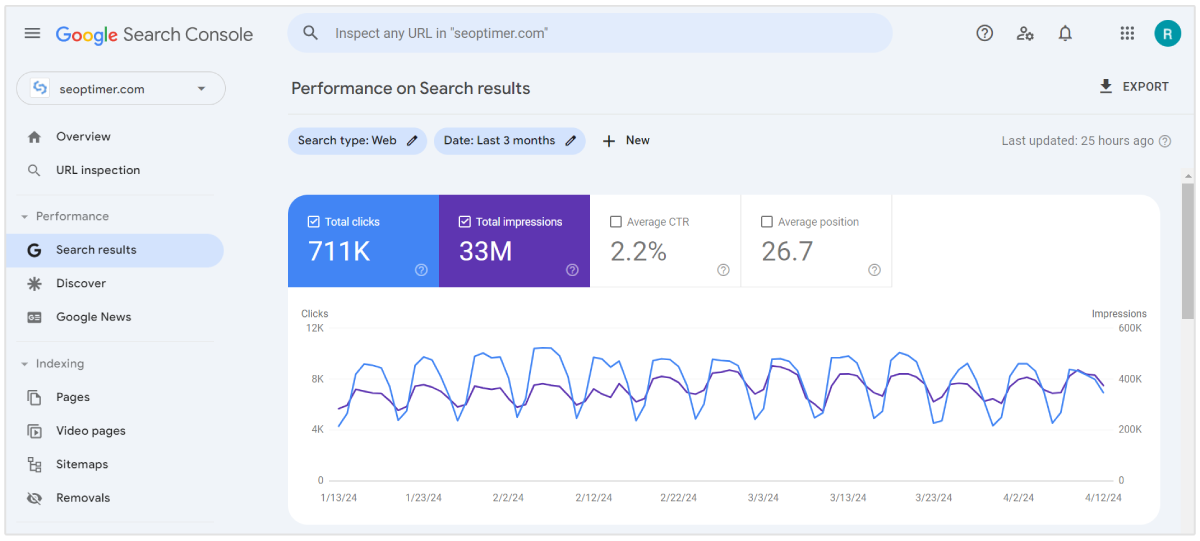
Umarah shared an example GSC summary with me from one of her client websites (shown above). As can be seen, total clicks constantly fluctuate each week.
"I use GSC at every stage of a project including setting up clients to checking their coverage issues (404's, 301's and everything in-between), to disavowing any toxic links they may have. I also make use of the queries users are searching for to improve on the pages they're landing on most often."
She optimizes web page content and keywords based on insights gained using GSC and other Google tools such as Google Analytics and PageSpeed Insights.
4. Screaming Frog
Cary Haun, Technical SEO Specialist at Colorado-based digital agency Twelve Three Media uses Screaming Frog.

Screaming Frog is a website crawler enables data extraction from a website for the purposes of finding SEO issues like broken links, unoptimized metadata, duplicate content and other SEO issues.
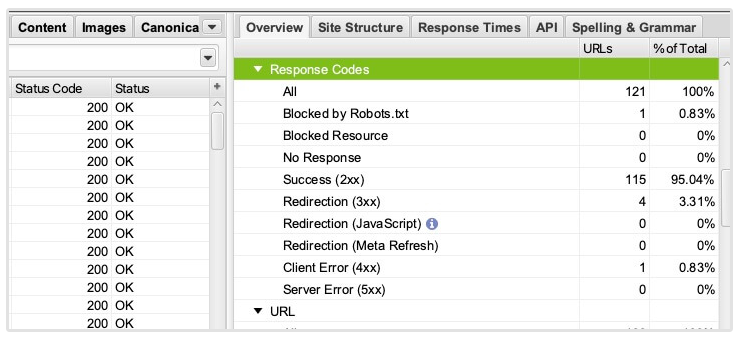
According to Cary, Screaming Frog's main advantage is its versatility. One can either get a quick snapshot of a website's internal linking structure, or deep dive into a specific issue as to why a certain URL could be misbehaving.
"Screaming Frog is indeed a quintessential tool for efficient SEO work. Both beginners and seasoned SEO specialists alike can find things to learn from this tool. It encourages a hands-on approach to SEO by letting the user get their hands dirty, presenting them with data in a raw yet accurate manner."
Cary uses the tool's Site Structure feature to visualize a site and how all the pages are (or are not) linked to each other. People understand things in many different ways and with different methods as well.
"Me personally, I am more of a visual learner despite my occupation being primarily text-based. So, being able to see the site 'all at once,' if you will, is very helpful with communication for both myself and the client."
5. Google Analytics
John McGhee, Managing Partner at Tennessee-based digital agency Webconsuls uses Google Analytics (GA).

Most websites rely on Google Analytics to track and report on their website traffic. And like most digital agencies, John and his team use Google Analytics frequently for tracking client traffic performance.
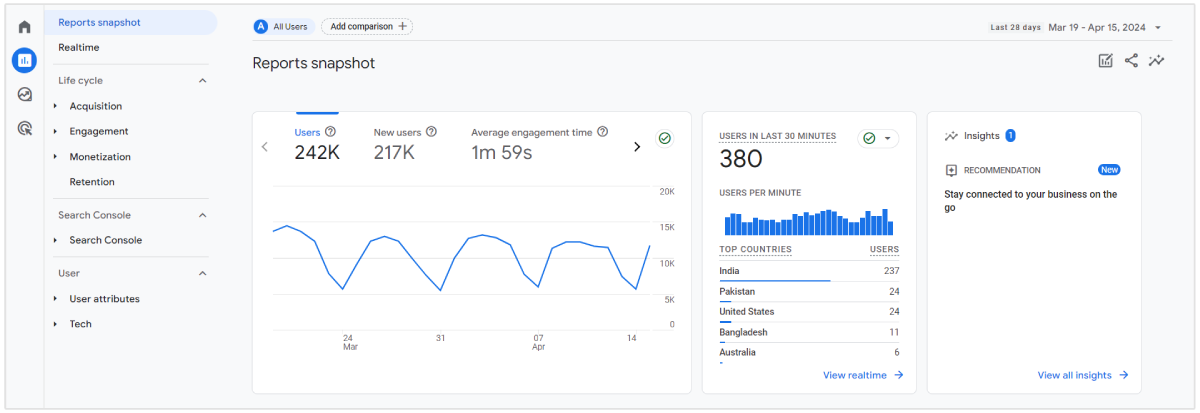
"It's free and it provides elaborate insight into your website's performance. We use this to analyze performance and inform content decisions."
Analytics helps identify not only how many users visited your site, but also how they interacted and behaved after visiting.
"It also has a very underrated content section called 'Content Drilldown' that helps identify what content users relate to and interact with the most."
John and his team use GA's Content Drilldown feature to inform mostly design, content, and internal linking website changes. They tie the metrics to the user journey in a logical way. For example, in the screenshot (above), the 'web-design-portfolio' has a lower bounce rate than the 'web-design' page.
"One tactic would be to make a more prominent link to the web design portfolio page from the web design page. This leads to fewer users bouncing from the web design page, sends them to a page users find interesting, and helps overall website metrics."
Some pages won't apply, and that's where the logical aspect of it comes in. For example, some pages with a comparably high bounce rate have form submission actions on the page, so the bounce rate isn't as big of a consideration as it would be on other pages.
6. Local Ranking
Aqib Noor, Content Specialist at Canadian digital agency Puppetbrush uses Local Ranking.

Local Ranking is a Google My Business (GMB) management tool that enables local stores to schedule posts, manage reviews, and check and track local rankings - all from a single dashboard.
Aqib uses Local Ranking to monitor progress which makes reporting much easier. He says Google has been overhauling the way it provides results for local queries. As a result, he's seen Google's local algorithm weighing proximity as a rating factor more heavily.
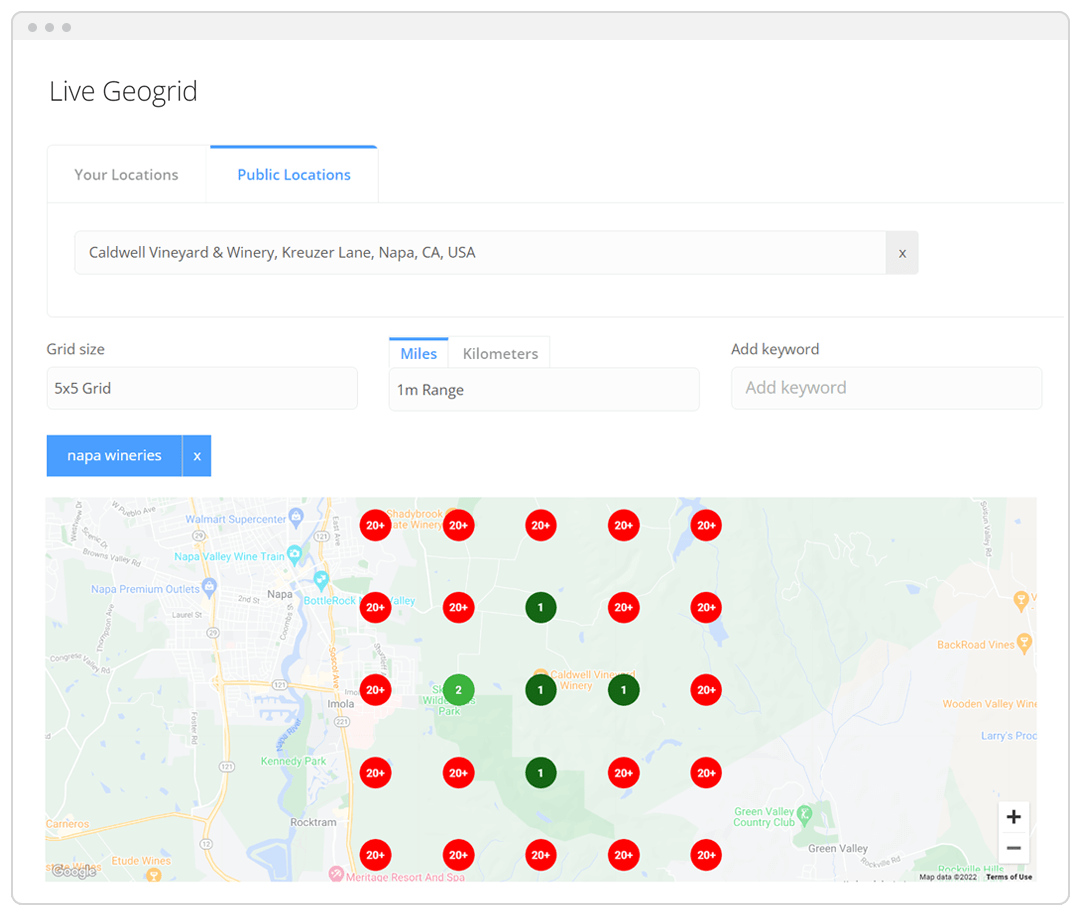
Aqib uses Local Ranking's GeoGrid search tool (shown above) to track the local map rankings of businesses on Google. Each node can be clicked to see where & how competitors are ranking based on each location.
"When you show a potential client, the areas in which their position ranks poorly, it immediately piques their interest in GMB optimization."
For brick-and-mortar clients, local SEO is the battleground. But GMB can become unwieldy if you manage lots of locations across several clients. Consolidating your local SEO activities into a GMB management tool like Local Ranking could be a great move.
7. Connectively (formerly HARO)
Ashley Regan-Scherf, Executive Content Writer at Australian digital agency RGC Advertising uses HARO (Help A Reporter Out).

HARO is a popular connection platform whereby journalists or publishers can submit a 'callout' - typically this includes a brief of what they are writing and the kind of submissions they want. Then, expert sources can respond to the callout and 'pitch' the journalist or writer in a few paragraphs that answers the brief.
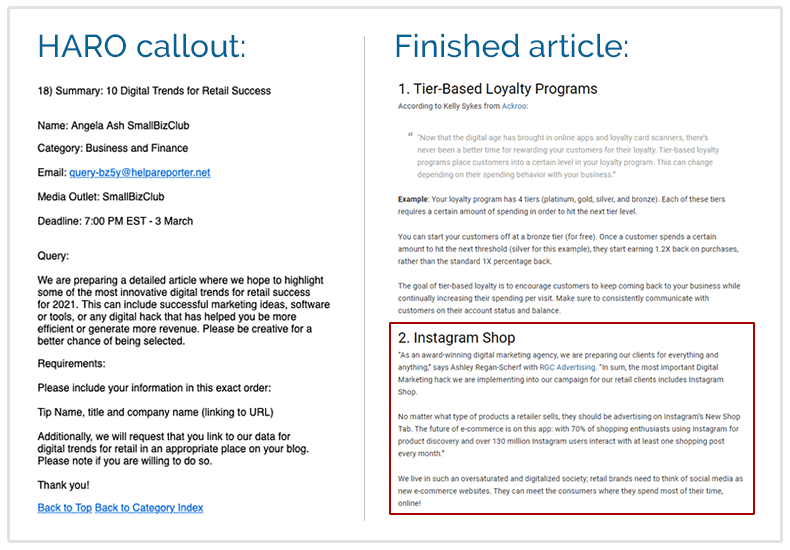
HARO helps websites build quality backlinks fast. Backlinks are essentially a hint to search engines that others endorse your material. Building great backlinks takes time, but HARO is a great resource that can help speed up the process and ensure your website is as effective as possible. Every weekday, HARO sends three source request emails, one for each sector.
"HARO is a great SEO tool to help build a website's backlinks. Backlinks are particularly beneficial to SEO because they reflect a 'vote of confidence' from one location to another."
If you see a request that matches your clients' industry and can quickly provide a quote, you should answer the query, and then if yours is selected as a source, you might end up in the final article.
"Even if you don't have much PR expertise, resources, or a large budget, you will always benefit from HARO's opportunity to gain authoritative backlinks with minimal effort and money."
Ashley shared an example with me above where she responded to a callout from SmallBizClub. Her great submission was then accepted and published in their final article titled '13 Digital Trends for Retail Success'.
8. Exploding Topics
Nathan Sebastian, Content Marketer at American agency review site GoodFirms uses Exploding Topics.

The tool shows rapidly growing topics that are yet to be covered by most people. Exploding Topics returns topics that are yet to enter the trending category but the keywords are already being searched online.
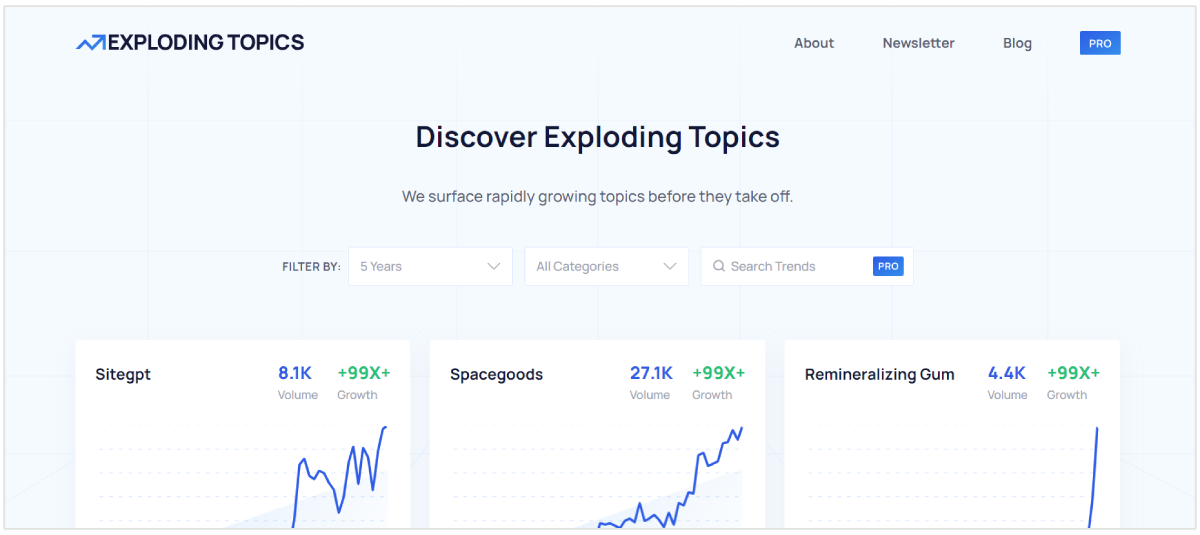
By creating content around these soon-to-trend topics, you can achieve high-ranking positions before the topics become too competitive.
"A unique feature of the tool is that it categorizes the topics into three categories. First are the exploding topics that are currently trending. Second, are the regular topics that are gaining popularity slowly with time. Lastly, peaked topics that were trending but are now declining in popularity."
Nathan thinks Exploding Topics is better than Google Trends in a way because it allows you to choose topics without even entering a keyword. All you have to do is select a category and the tool displays multiple topics that you can work with.
9. Mangools
Jon Torres, San Diego-based SEO Marketer and Founder at JonTorres.com uses Mangools.

Mangools is a multi-function SEO tool for keyword research, rank tracking, SERP analysis, backlink tracking and more.
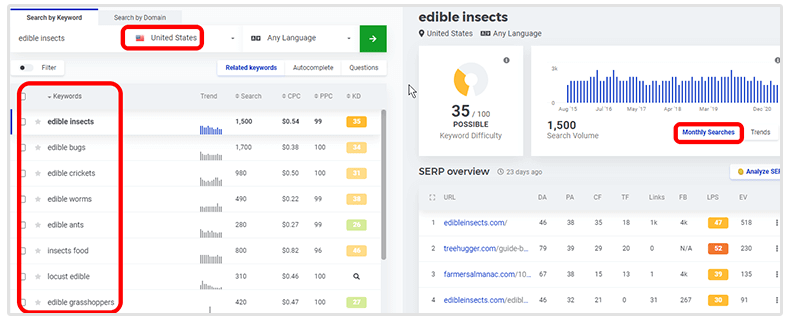
"Like many businesses during the pandemic, I was conscious about minimizing expenses while getting the most value back. It is during that time I discovered I could integrate Mangools into my workflow, without shelling out the $400+ monthly subscription typical of popular alternatives."
While some features like a Broken Link Checker are missing on Mangools, it still offers a handy keyword research tool, SERP analysis, and competitive research features.
"With Mangools, I can easily find high and low-competition keywords for my PPC/advertiser, long-tail keywords for my niche site clients, and a combination of both to enhance my online visibility management strategies."
In using a lower-cost tool, Jon passes the savings on to struggling small business clients by offering more affordable SEO optimization packages that work. This means he can still make data-led decisions about his client's SEO strategy and bring them real ROI without leaving them broke.
10. GTmetrix
Martina Nakov, SEO Specialist at UK digital agency Best Response Media uses GTmetrix.

The tool analyzes the page load speed of a site’s pages and identifies potential areas for improvement.
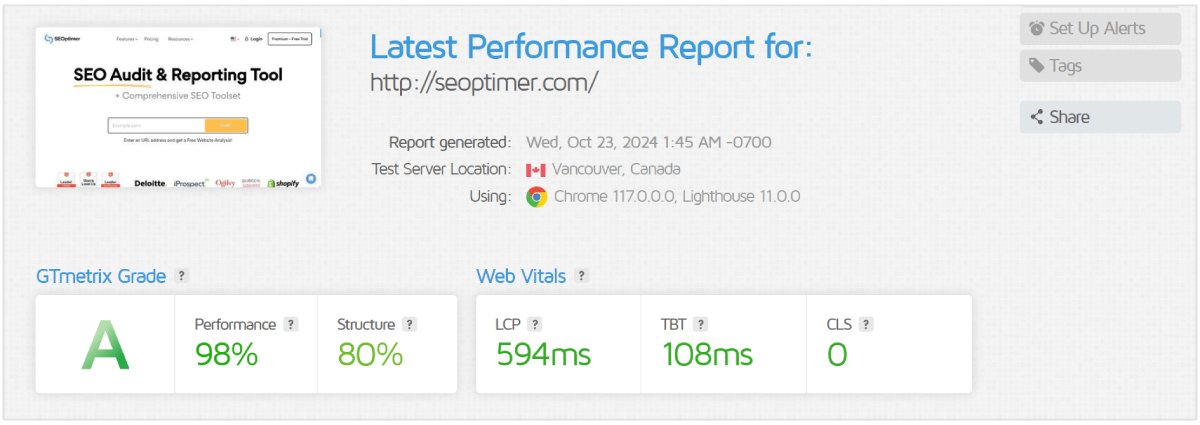
In the example (above) shared by Martina, we can see Largest Contentful Paint (LCP), Speed Index, Time to Interactive and Total Blocking Time (TBT) are the main areas for improvement on this particular website.
"The great thing about GTmetrix is that once it is done analysing a web page, it lays out a bunch of actionable suggestions. For example, if un-optimized images are what is making your page slower, GTmetrix lists exactly which images are causing this issue and how you should fix them."
Page load speed greatly affects the quality of a site and search rankings. Martina likes how GTmetrix summarizes all page speed performance to a single grade.
"If the grade is F, you know there’s a lot of work ahead of you!"
11. Frase
Richard Kennedy, Owner at UK SEO agency Arken Marketing uses Frase.

Frase is a content optimization tool powered by AI which creates automated content briefs and optimization workflows. In Frase's own words, the tool "makes writing for search engines easier".
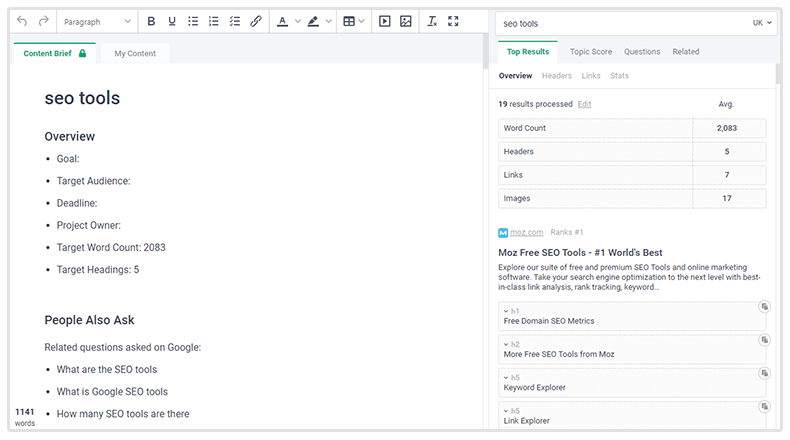
Richard shared the example (above) where he has created an article with the title "SEO tools" and Frase has automatically suggested a word count, headers, links and images in order to optimally compete against the other results for this keyword phrase.
Richard's team uses Frase to go through all the competitor headers, so they can better tailor the content to the reader. Frase also shows the "People Also Ask" section of the search results page which helps them answer specific questions around the topic.
"Frase is a tool that we as an agency added to our toolkit at the beginning of the year. We create a lot of content for our clients and Frase has helped us improve the quality of what we create."
Richard also uses Frase to turn these insights into detailed briefs for his writers within minutes so they can craft content that importantly addresses the intent behind peoples' searches.
"Frase does a good job of creating topic clusters automatically, using this we can split up our content in parts that our visitors want. Doing this has increased the number of keywords we can target for any given piece of content."
A content optimization tool like Frase can also be perfect to help you optimize already published content to improve existing search positions too.
12. SEO Minion
Jake Peterson, SEO Specialist at Tennessee-based digital agency ATIBA uses SEO Minion.

SEO Minion is a Chrome plugin that provides a quick snapshot of a webpage, including everything from structured data to headings and exports it to a summarized screenshot, great for sharing with a client.
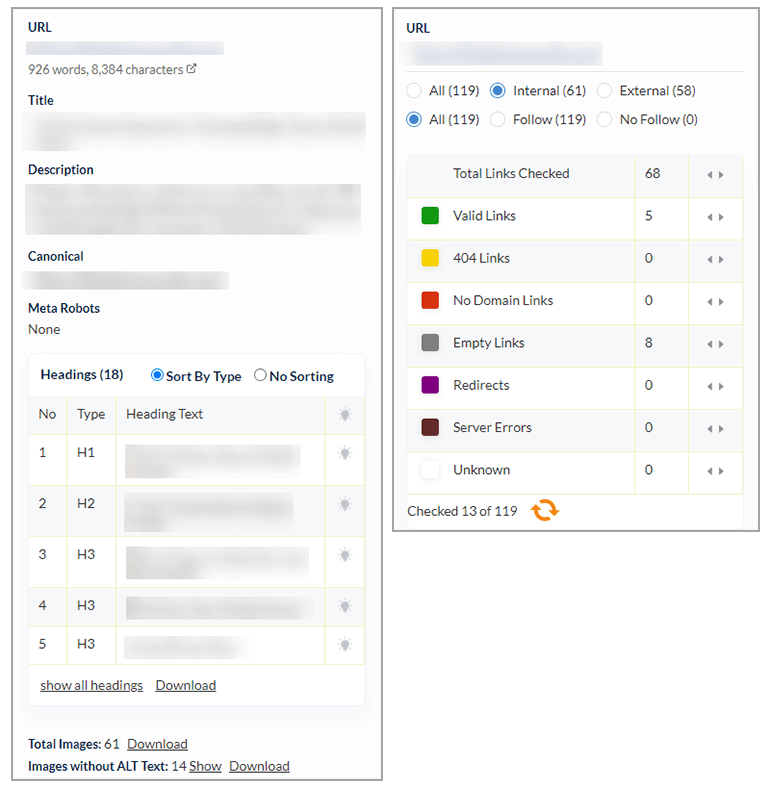
Unlike most of the other tools mentioned in this article, being a Google Chrome plugin, SEO Minion augments the Google search results page and client websites with extra contextual information.
"We use it to check the content layout of a page, word count and many other attributes. It's a quick and easy tool that allows you to take stock of a certain page."
Jake uses SEO Minion with clients to show them areas where their content could improve.
"Sometimes large site audits can be overwhelming and it's good to look at one page at a time to show a client what they can change."
By drilling down to the page level, Jake can easily show a client a quick summary from SEO Minion and say things like "See, the text you think is a header is actually just bold text and not a header" or "You have a lot of images on this page, it might be why things are slowing down.", etc.
"I've found it's always good to try and put images and real examples in front of clients to help them understand."
13. Rank Math
Veronica Fernandes, SEO Expert & Writer at New York-based SEO agency Creative Media Technology uses Rank Math.

Rank Math is a WordPress plugin that makes on-page SEO simple yet efficient. Similar to Yoast, it adds a panel to your post composition page in WordPress which displays SEO insights based on your input.
The first step in Rank Math is to define your focus keywords. But unlike Yoast, Rank Math allows you to add multiple focus keywords to each post, enabling optimization across different keywords on a single article.
The first focus keyword is called the 'primary focus keyword' (highlighted as green in the example below), and all the other keywords are considered 'secondary focus keywords'.
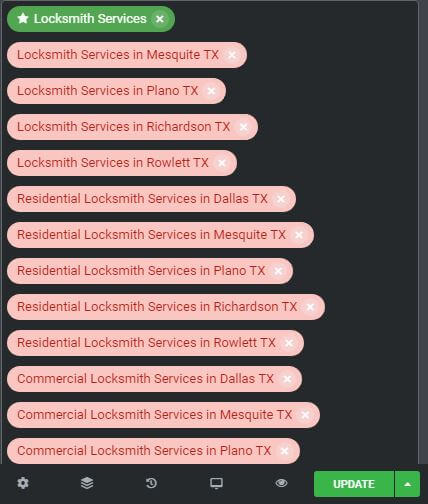
Rank Math also performs a number of checks on the post (see screenshot below) and summarizes this into an SEO score out of 100. An SEO score above 80 means the content is optimized and ready to be published, whereas a score lower than 80 means further optimizations are required.
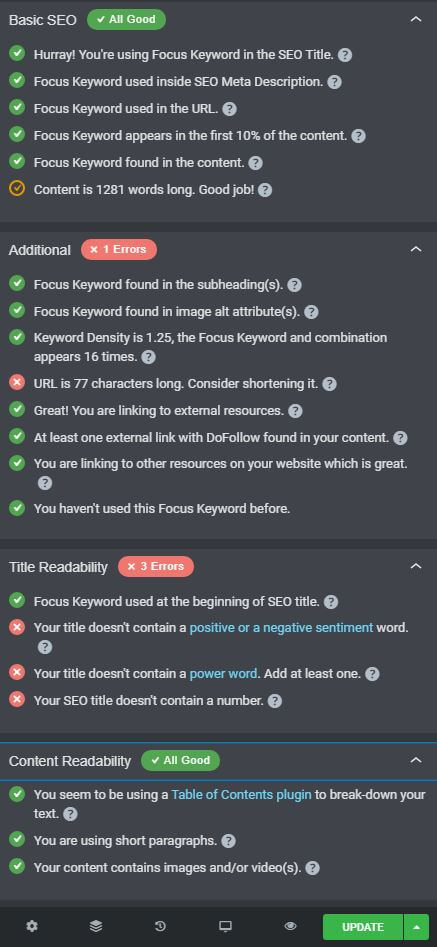
"The best part about Rank Math is that it tells us the ways to improve the SEO score. It provides a checklist and list of errors. The more errors you remove, the higher your SEO score will be."
14. MarketMuse
Solomon Thimothy, Co-Founder at Illinois-based white-label platform for agencies Clickx uses MarketMuse.

MarketMuse is an AI-powered content intelligence and strategy tool. It provides overall content strategy including keywords, word count, internal links and more.
.png)
Solomon and his team use MarketMuse because it's proven to have delivered results to their SEO projects and helped articles rank higher in Google.
15. Keywords Everywhere
Brandie Erisman, Owner at New Mexico-based SEO agency Riverview Lane uses Keywords Everywhere.

Keywords Everywhere is a Google Chrome plugin that shows keyword info on the fly, right in the Google search results page. There are a few tools that do the same things as Keywords Everywhere, but Brandie chooses it because it's quick, easy and cost-effective.
.png)
Keywords Everywhere returns search volume and CPC right under the search bar. Off to the side, it shows historical search volume, trending keywords, related keywords, long-tails, and people also ask queries (with volume, CPC & competition) -- all without having to jump to another screen.
Brandie shared the example above of 'mri and ct scan' results. Based on this quick search, she decided to create an article on the "difference between mri and CT scan," (which supported two of the client's services).
"The keyword stats are especially handy when talking with clients. Clients like numbers. I can steer them in the right direction quicker with just a simple web search. Everything I need is displayed right on the search results page."
Keywords Everywhere also shows which keywords a particular URL or domain ranks for. You can see SERP position and estimated traffic, along with the standard volume, CPC and relative competition score.
16. Trendstastic
James Oliver, Director at UK digital agency Evolved Toaster uses Trendstastic.

Trendstastic is a Google Chrome plugin that augments the search result page with Google Trends data. This can be useful when creating content, optimizing content and of course understanding search volume trends.
"Trendstastic is by far the fastest and easiest way to assess if you have a 20-50% drop in traffic to know if that's normal."
James says many keyword tools are misled by traffic spikes and just report 'total searches' without providing clarity about how the search volume changes throughout the year. He provided the following examples - 'Pokemon Go' is an example of a topic that spiked a few years ago:
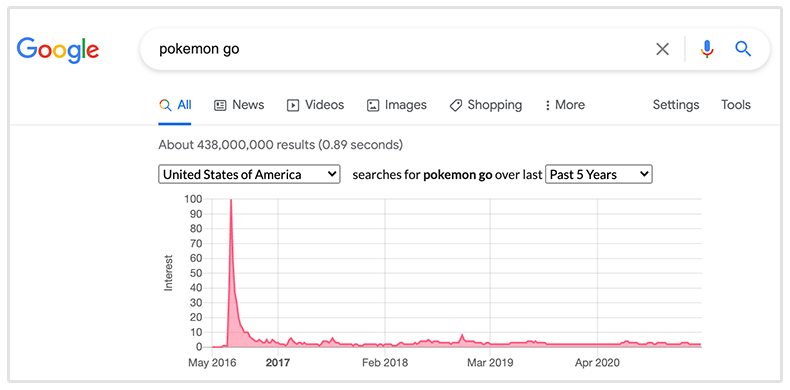
Whereas 'lawn mower reviews' seasonally peak in May and have very little search volume on Black Friday.
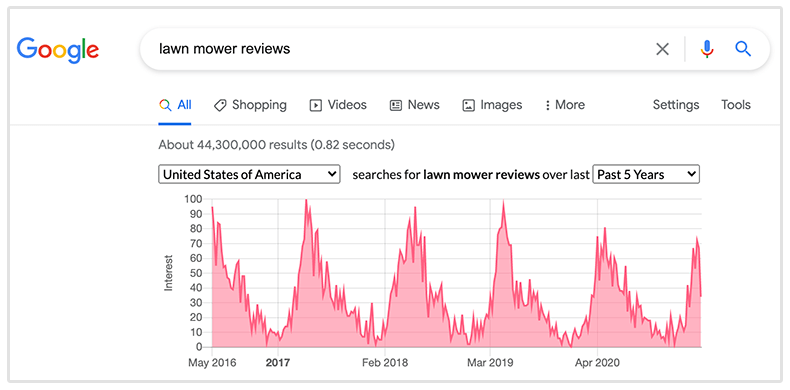
James' team loves using Google Chrome extensions like Trendstastic, to quickly analyze data in the SERP (Search Engine Result Page) to passively and actively get the job done without leaving the page.
17. SEOJet
Bryan Philips, Head of Marketing at Australian digital agency In Motion Marketing uses SEOJet.

SEOJet is a backlink management tool that helps you understand what type of anchor text you need to use when building backlinks.
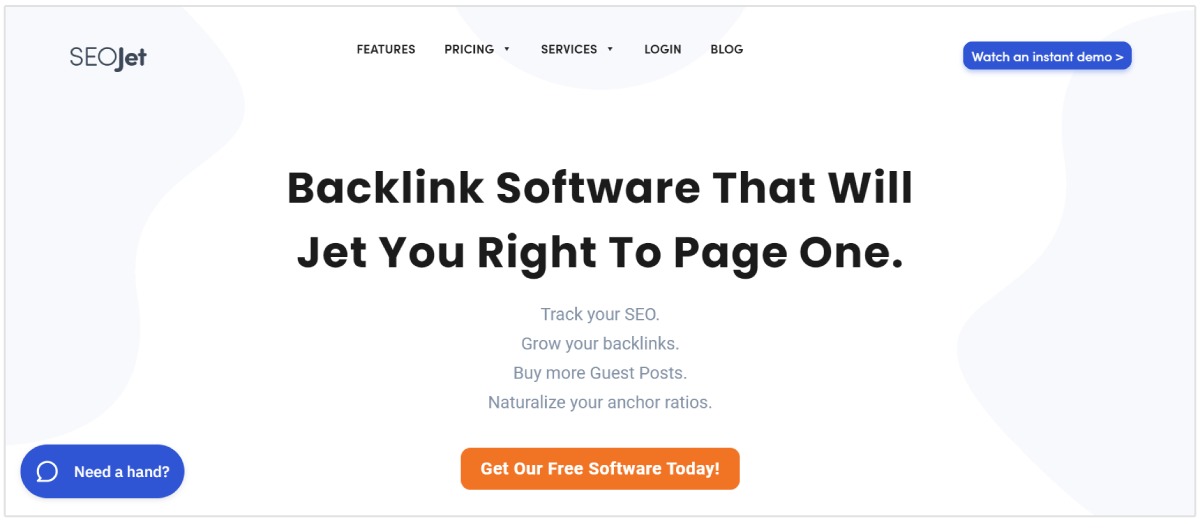
The software breaks down all links going to the top sites that are ranking on a SERP and tells you what kind of anchor text they have in their backlinks so you can match it.
"I've used it for several years and have had great results. The owner of the tool provides tons of resources to help with link building as well."
18. Clearscope
Timothy Josiah Haynes, VP of Content & SEO at Tennessee-based content marketing agency Content Creators Agency uses Clearscope.

Clearscope is an SEO content optimization platform that helps simplify SEO writing with title and content suggestions relevant to what people are searching for.
"Some keywords surprise us; we wouldn't have covered certain topics without Clearscope showing us that Google values those keywords -- assumedly because readers value information about those keywords."
Timothy shared the screenshot with me (below) about how they also use Clearscope for competitor research. This is a great way to determine article word count based on how comprehensive competitor articles are.
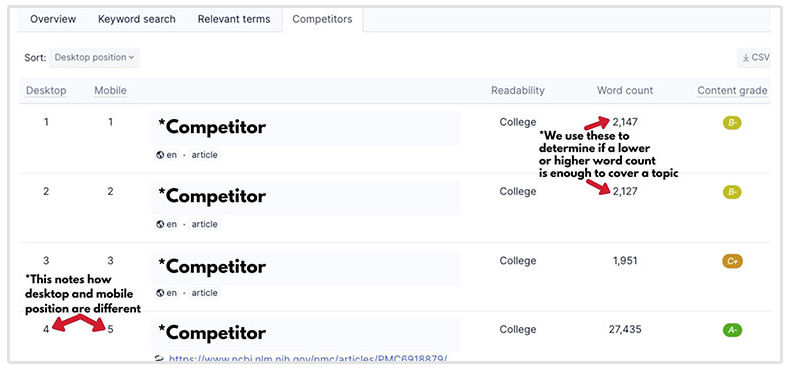
Timothy and his team also use Ahrefs to fill any functional gaps that Clearscope doesn't cover.
19. TubeRanker
TubeRanker is a YouTube SEO tool that agencies use to optimize videos and YouTube channels. The toolset consists of the following features:
- YouTube channel audit
- YouTube tag generator and extractor
- YouTube keyword tool
- rank tracker
- title and description generator
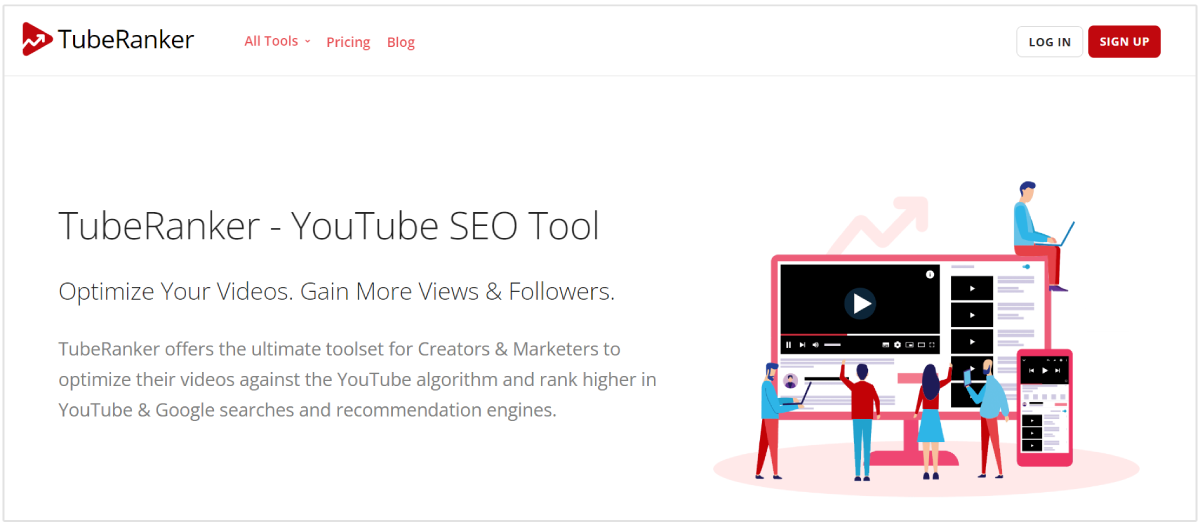
Video marketing agencies can use the channel audit feature to show potential clients which areas of their YouTube channel need to be fixed in order to improve video rankings.
20. AltTextGenerator.com - Free Instant AI Alt Text Generator
Image alt text is one of those fundamental aspects of SEO that you just can't miss. Well thanks to AI technologies, it's super easy to generate these snippets of texts for your image alt tags.
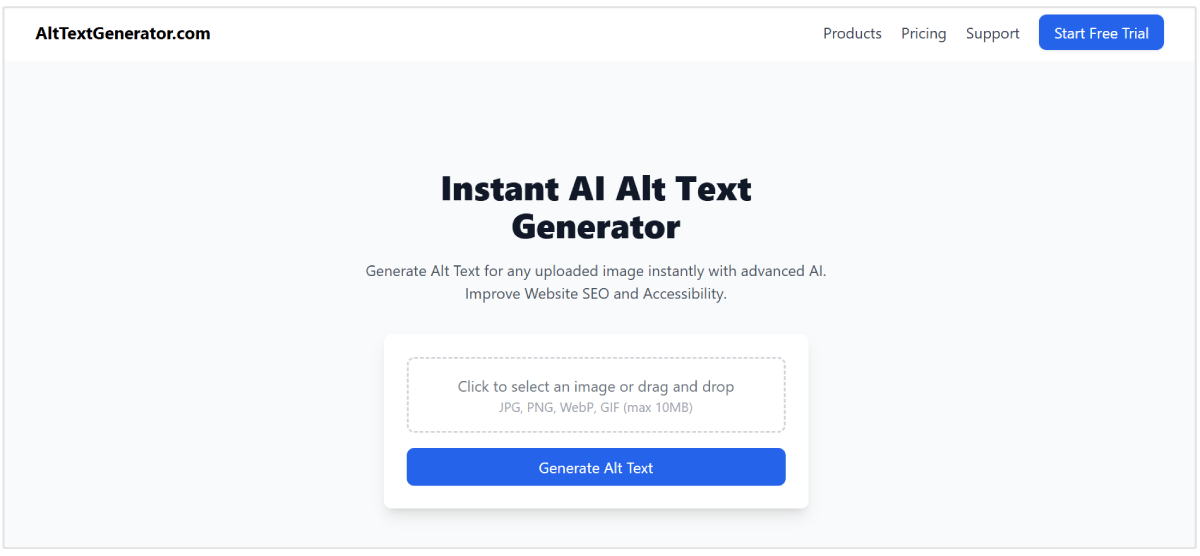
Just upload an image, and the tool will generate an SEO-optimized alt text that meets all of Google's guidelines for alt tags.
The great thing about this tool is that it will soon intergrate with WordPress, WooCommerce, and Shopify. So when you integrate AltTextGenerator.com with your CMS, you can automaticlly generate image alt text on the fly for all of your products images and blog media in just a few clicks.
Connecting Agency Processes with SEO Software
Picking the right SEO agency software is step 1 but integrating them into your own processes is the next step. Consider the learning curve required for each tool. Think about any necessary upskilling and/or ongoing training for your team.
Documenting this will make it easier when onboarding new hires into the agency and help them hit the ground running early on. During this documentation phase, focus on client and project outcomes first and foremost ahead of features/functionality.
Connecting SEO software tools with client & project outcomes also helps you better rationalize on-charging these tools to the client, if you decide to do this.
What Do You Think?
What SEO software does your agency use? Have you used any of the tools on our list? Let us know on Twitter, tweet us @seoptimer - we'd love to hear from you!










